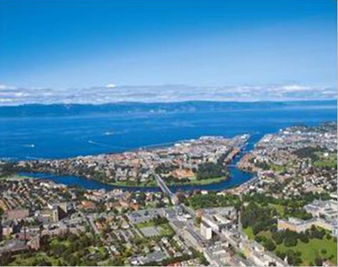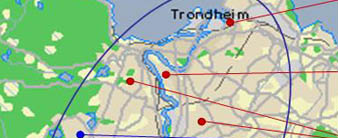| |


 |
Project
Cofunded by the
European Commission |
|
|
The project Trondheim community, Norway |
|
 |
|
|
Introduction |
Trondheim's municipal climate action plan
- Reduce greenhouse gas emissions by 20% from 1999 levels by 2010
Objective related to stationary energy consumption:
- Increase the amount of renewable sources in the energy
system
- Reduce energy demand by improved energy efficiency
- Sustainable utilization of local resources for energy
production
This shall be accomplished through:
- Municipal energy planning & active use of legislation
- Implementation of energy conservation initiatives
- Giving priority to sustainable use of renewable energy
sources
- District heating supply in all parts of the city
|
Trondheim holds a special place in Norwegian history and culture. It was the first capital
of Norway, and is still the city where new kings receive their ceremonial blessing. The city is situated by the Trondheim fjord, it is surrounded
by forested hills, with the Nidelva river winding through the town.
The ECO-City city demonstration sites in Trondheim comprise a whole integrated community approach and demand side.
The community participants include the main actors in town planning, city development and energy infrastructure, including the municipality
of Trondheim, the utility of Trondheim, the building company of heimdalgruppen, TOBB, Stiftelsen Svartlamoen, SINTEF and the consulting
company COWI Norway.
The concerto project will set a reference for new standards to prevail in the community both in retrofitting, new buildings, energy supply and
use polygeneration. The new intelligent metering to be tested is expected to form the future standard to be used in the community. Also the
approach will be anchored in the whole community through training of SME's and schools and through extensive dissemination.
|
 To Top To Top
|
Location of Trondheim.
|
 |
|
 View the whole picture View the whole picture |
|
The overall objective
|
 |
Renewable energy supply (RES)
• 1000 kW biomass boilers
• 433 kW heat pumps
• 15 m2 solar collectors for domestic hot water
|
|
|
 |
Energy efficiency in buildings (RUE)
• 374 new and rehabilitated ECO-dwellings
of 23,300 m2
• 3 schools of total 23,500 m2 and ECO-
rehabilitation of commercial / cultural building
of 3000 m2
• New cooling central at 200,000 m2 hospital
|
|
|
 |
Polygeneration
• 6 MWth energy conversion central with 3 MW
absorption cooling and district heating from
waste
|
|
|
 |
Integration of RES and RUE
• Use of waste and possible storage in waste
to improve energy utilisation efficiency from
76% to 89%
• Waste-based district heating to supply the
ECO-buildings with integration of RUE actions
|
|
|
 |
Specific innovations
• Intelligent metering
|
|
 To Top To Top
|
|
|
|
|
|
|
|
|
PROJECT AND SUBCOORDINATORS |
|
|
|
 |
|
|
|
|
|